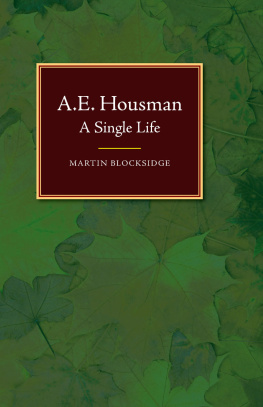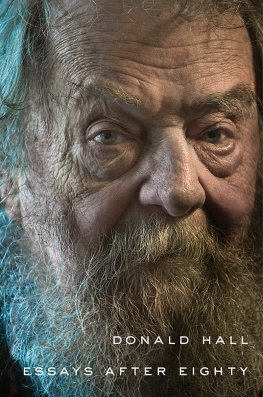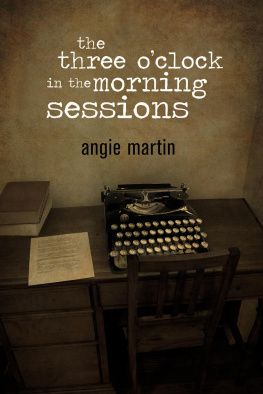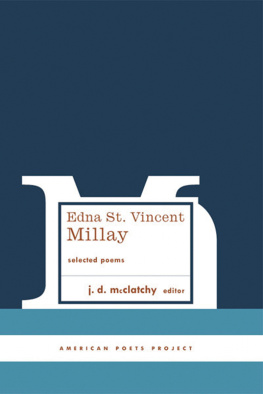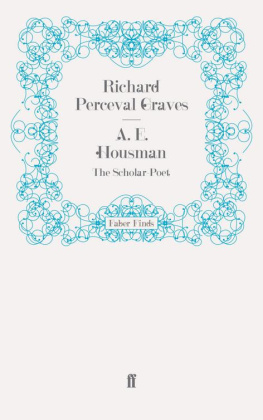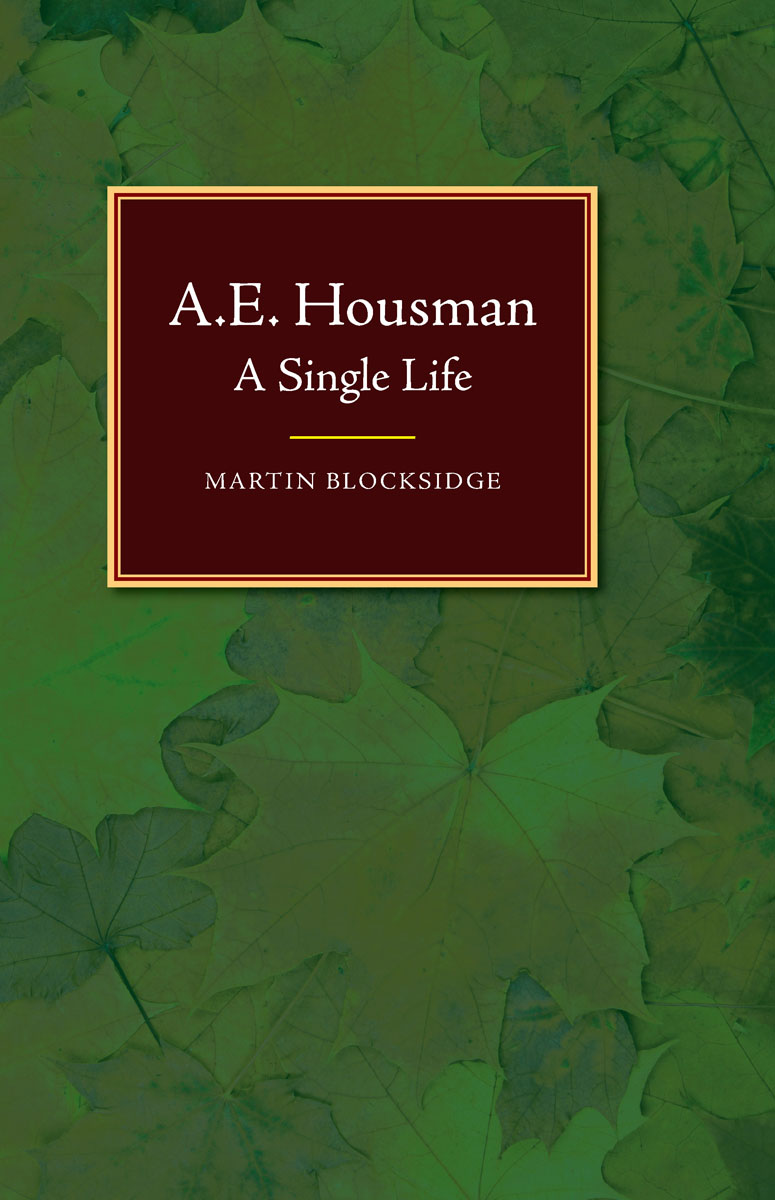
A.E. Housmans poetry (especially A Shropshire Lad) remains well-known, widely read and often quoted. However, Housman did not view himself as a professional poet, always making quite clear that his proper job was as a Professor of Latin. Housmans fame as a poet has often obscured the fact that he was the leading British classical scholar of his generation, and a Cambridge Professor. It has also sometimes been suggested that Housmans two areas of activity are the sign of a flawed or divided personality. A.E. Housman: A Single Life argues that there is no fundamental tension between Housman the poet and Housman the scholar, and his career is presented very much as that of a working academic who also wrote poetry. The book gives a full account of what Housman described as the great and real troubles of my early manhood, and in particular his unrequited and life-long love for his undergraduate friend Moses Jackson. It resists the temptation to classify Housman too exclusively as a melancholic, and is sceptical about Housmans reputed rudeness and misanthropy, pointing out that, though Housman was famously aloof in manner, he was notably loyal and generous, courteous in his daily dealings and generally liked by those who knew him. He also possessed a highly developed sense of the absurd and a ready and often disconcerting wit, features which characterised not only his letters and miscellaneous writings, but also, famously, much of his scholarly work.
Martin Blocksidge is a freelance author and biographer. His most recent work, The Banker Poet: The Rise and Fall of Samuel Rogers, 17631855, followed A Life Lived Quickly: Arthur Hallam and his Legend, described in the Times Literary Supplement as scrupulously fair-minded balanced and believable. Martin Blocksidge was Head of English at the Royal Grammar School, Guildford, and Director of Studies at St. Dunstans College, London, and former President of The English Association.
Copyright Martin Blocksidge, 2016.
Published in the Sussex Academic e-Library, 2016.
SUSSEX ACADEMIC PRESS
PO Box 139
Eastbourne BN24 9BP, UK
and simultaneously in the United States of America and Canada
All rights reserved. Except for the quotation of short passages for the purposes of criticism and review, no part of this publication may be reproduced, stored in a retrieval system or transmitted in any form or by any means, electronic, mechanical, photocopying, recording or otherwise, without the prior permission of the publisher.
British Library Cataloguing in Publication Data
A CIP catalogue record for this book is available from the British Library.
ISBN 978-1-78284-331-3 (e-pub)
ISBN 978-1-78284-332-0 (e-mobi)
ISBN 978-1-78284-333-7 (e-pdf)
This e-book text has been prepared for electronic viewing. Some features, including tables and figures, might not display as in the print version, due to electronic conversion limitations and/or copyright strictures.
Contents
CHAPTER ONE
My dear Mo
CHAPTER TWO
Was there ever such an interesting family as we were?
CHAPTER THREE
Oxford had not much effect on me
CHAPTER FOUR
The really emotional part of my life
CHAPTER FIVE
Out of the gutter
CHAPTER SIX
A greater scholar than Wordsworth and a greater poet than Porson
CHAPTER SEVEN
An asylum in every sense of the term
CHAPTER EIGHT
In the hopes of dropping dead
Preface and Acknowledgements
On 3 January 1927, A. E. Housman wrote to his sister that he had, during the previous year suffered from having to sit to two artists who were commissioned to make drawings of me Each thinks that the other has done it badly, and indeed I can hardly be like both.
Housmans appreciation of this particular absurdity neatly, though unconsciously, symbolises much about his life. There has been a tradition in biographical writing about Housman to suggest that he was, as it were, two people: the melancholy lyric poet of A Shropshire Lad, and the severe and formidable Classical scholar and university professor. It is the contention of this book that the disjunction between Housman the poet and Housman the scholar is, on the surface, obvious, but that to see Housmans life as divided in any fundamentally psychological sense is misleading. Housman did not see himself primarily as a poet: he saw himself as a scholar who had occasionally written poetry, and this biography seeks to reflect that fact. Housman was also aware that, however celebrated he might have been as a poet, his reputation as a scholar was (and probably remains) higher. To find any kind of tension between the two areas of Housmans life is not really borne out by an examination of the facts of that life. Housman, after all, lived only one life, and it was one in which the poet and the scholar were contained without any ultimate incongruity. Commentators on Housman have been far more likely to worry over the fact that he did not live the life of a professional poet, than, for example, commentators on Philip Larkin or Wallace Stevens, both of whose professional lives were equally unpoetical.
Nevertheless Housmans life did contain contradictions of other kinds and they prove fascinating to a biographer. It is not just the two portraits of 1926, for example, which fail to agree about Housmans appearance. In his own lifetime he was described as being both dowdy and dapper, tall and slight, tongue-tied and amusing. That Housman was, as a university lecturer, notably aloof, that he had little by way of small talk, and that he famously refused to acknowledge passers-by on his daily afternoon walks, did much to contribute to the legend of him as a withdrawn and even misanthropic figure. Yet those who knew him better recalled his wit and courtesy, his consideration for others, and his silvery laughter. However gloomy the world-view of A Shropshire Lad, and however savage Housmans attacks on other Classical scholars, even the most cursory reading of his letters reveals an abundant and often satirical sense of humour, allied to a finely-honed appreciation of the absurd, and a frequent reluctance to take himself too seriously. If Housman cut an austere figure in the streets of Cambridge, he was quite explicit about the fact that his own philosophy of life took as its chief aim the pursuit of pleasure, which he found particularly in good food and wine as well as in foreign travel. In later life, though he may outwardly have looked old-fashioned, he was almost certainly the first Cambridge professor regularly to travel to Europe by aeroplane. Those who found his manner guarded and forbidding would also have been surprised that his private acts of generosity to both deserving and less deserving causes were considerable. As a poet, Housmans voice could sound wounded and plaintive, but he himself was courageous in facing the problems consequent upon both life and death.
James Boswell described writing the life of Samuel Johnson as a presumptuous task, and his words are equally applicable to writing the life of A.E. Housman. It was the opinion of Housmans brother (and literary executor), Laurence, that a full biography [of him] lies outside the range of any single writer. Housmans colleague and friend A. S. F. Gow wrote in very similar terms when he insisted that a biographer of Housman needed qualities, widely different and seldom united, especially as he believed that Housmans life falls into several markedly distinct sections, and it is hard to see who could treat of them all with sufficient knowledge. Perhaps it is the case that any biographer of Housman is thus fated to meet with only partial success, but the fact that Housman has often proved an elusive subject is, in its own way, a stimulus as much as a deterrent, especially as his life has obstinately remained a source of interest in both fact and fiction, as, for example, the success of Tom Stoppards play about Housman,
Next page
